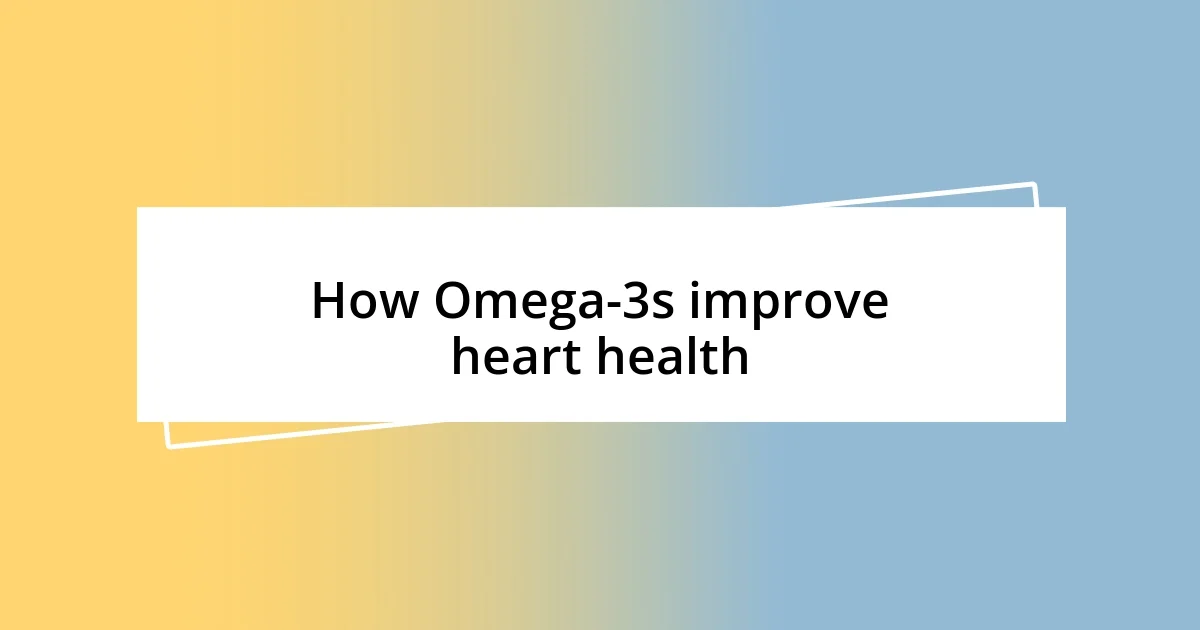Key takeaways:
- Omega-3 fatty acids are essential for health, specifically benefiting brain function, heart health, and inflammation reduction, with notable types being ALA, EPA, and DHA.
- Health benefits of omega-3s include improved heart health, cognitive function, inflammation reduction, and mood enhancement, which can significantly enhance overall well-being.
- Incorporating omega-3s into the diet can be achieved through food sources like fatty fish, flaxseeds, and walnuts, and simple dietary changes can lead to substantial health improvements.

What are Omega-3 fatty acids
Omega-3 fatty acids are a type of polyunsaturated fat that is essential for our health, meaning our bodies can’t produce them on their own. I remember when I first learned about them during a nutrition seminar; it was an eye-opener for me. These fatty acids are primarily found in fish, flaxseeds, and walnuts, and they play a crucial role in brain function, heart health, and inflammation reduction.
There are three main types of omega-3s: ALA (alpha-linolenic acid), EPA (eicosapentaenoic acid), and DHA (docosahexaenoic acid). Each has unique benefits, but I often find myself gravitating towards DHA because of its importance in cognitive development. Have you ever considered how much your brain depends on these nutrients? I certainly didn’t until I started noticing the link between my diet and my mental clarity.
When I think about omega-3s, I can’t help but reflect on the way they’ve transformed my approach to nutrition. Incorporating them into my meals—be it through a delicious salmon dish or a sprinkle of chia seeds—has been both fulfilling and beneficial for my overall well-being. It’s fascinating to think that such small dietary changes can have profound effects on our health, isn’t it?

Health benefits of Omega-3s
When I dived deeper into the world of omega-3s, I was surprised to learn just how significant their health benefits really are. These fatty acids have been linked to heart health, which made me rethink my own lifestyle choices. After discovering the correlation between omega-3s and lower triglyceride levels, I decided to include more fish in my meals. Suddenly, those days where I felt sluggish started to fade. It felt like my heart was thanking me!
Here’s a quick look at some of the key health benefits of omega-3s:
– Heart health: They can reduce the risk of heart disease.
– Brain function: Omega-3s are essential for cognitive function and may help reduce the risk of dementia.
– Inflammation reduction: They can decrease inflammation in the body, which is beneficial for conditions like arthritis.
– Mood improvement: Omega-3s have been linked to lower levels of anxiety and depression.
– Eye health: DHA, in particular, is crucial for maintaining good vision.
These benefits aren’t just scientific facts; they can genuinely enhance quality of life. I remember feeling more energetic and focused after incorporating more omega-3s into my daily routine. It’s remarkable how something as simple as a dietary change can lead to such profound improvements in well-being.

Best food sources of Omega-3s
Once I started exploring the best food sources of omega-3s, I discovered a delightful variety of options. Fatty fish like salmon and mackerel stood out to me, not just for their nutritional benefits but also for their rich, satisfying flavors. There’s something so comforting about a well-cooked salmon fillet, and it serves as a powerhouse of EPA and DHA. On days when I include seafood, I feel a boost in my mood and energy.
Plant-based sources of omega-3s offer exciting alternatives for those who don’t consume fish. Flaxseeds, chia seeds, and walnuts quickly made their way into my pantry. I’ll often sprinkle flaxseeds over my morning yogurt or blend chia seeds into smoothies. What I really appreciate is that these options are versatile and can easily fit into a busy lifestyle without sacrificing nutrition. Have you ever tried incorporating them into your meals? It’s a simple change that can yield amazing health benefits.
Diving deeper into food sources, I found that algae-based supplements are a great option for vegetarians. In my experience, these contain DHA and EPA without the fishy taste, making them an appealing choice. It’s fascinating how a simple shift in our diet can lead to positive health outcomes. Trying different sources can be like a culinary adventure, and I’m always eager to discover new recipes that please my palate while nourishing my body.
| Food Source | Type of Omega-3 |
|---|---|
| Salmon | DHA and EPA |
| Flaxseeds | ALA |
| Walnuts | ALA |
| Chia Seeds | ALA |
| Mackerel | DHA and EPA |
| Algal Oil | DHA and EPA |

Recommended daily intake of Omega-3s
When it comes to the recommended daily intake of omega-3s, I’ve discovered that it can vary depending on individual needs. Generally, health organizations suggest around 250 to 500 milligrams of combined EPA and DHA for adults, which I find to be a manageable target. It’s amazing how even small changes, like having a couple of servings of fatty fish a week, can help meet these guidelines.
I often reflect on my journey with omega-3s and how I initially struggled to hit that target. After incorporating a daily tablespoon of flaxseeds into my breakfast, I began to notice how easy it was to boost my intake. It made me wonder—how many people overlook the importance of tiny adjustments like this in their diets? This small shift not only enhanced my meals but also helped me feel more in tune with my nutrition goals.
For those who might be wondering about specific populations, pregnant women and nursing mothers have higher recommendations, up to 200 to 300 milligrams of DHA daily, to support fetal and infant development. I remember reading about this and thinking about how crucial omega-3s are during such vital stages. It really emphasizes how our nutritional needs evolve, doesn’t it? Being mindful of our intake can lead to a ripple effect on our health, influencing everything from cognitive performance to emotional well-being.

Omega-3 supplements pros and cons
Trying out omega-3 supplements has been quite a journey for me. On one hand, I’ve personally experienced the benefit of added EPA and DHA in my diet through capsules, especially on days I knew I wouldn’t get enough from food alone. It’s great to think that just a simple capsule can provide a significant nutritional boost. However, I also can’t help but ask myself, are supplements a complete substitute for whole food sources? The answer, I find, is a bit complex.
While I appreciate the convenience of omega-3 supplements, they do come with their drawbacks. For instance, I’ve found that some supplements cause digestive discomfort for certain people, including myself on rare occasions. This leads me to wonder if the extra expense is justified when there’s nothing quite like the satisfaction of a delicious meal rich in these nutrients. Plus, there’s always the question of sourcing; not all supplements are created equal, and some can have impurities.
Reflecting on the pros and cons, I see a balance that many might struggle to find. I often debate whether to rely on supplements or focus on whole food sources. It reminds me that nutrition is not one-size-fits-all; personal preferences and health needs vary greatly. What do you value more—convenience or the rich flavors of natural sources? It’s these personal choices that make the journey both challenging and exciting.

How Omega-3s improve heart health
I’ve discovered that omega-3s play a significant role in heart health by helping to lower triglycerides, which are a type of fat found in our blood. High triglyceride levels can increase the risk of heart disease, so incorporating omega-3-rich foods like salmon and walnuts into my diet has felt like a proactive approach to safeguarding my heart. Doesn’t it feel empowering to think that our food choices can influence such critical aspects of our health?
Additionally, omega-3s are known to reduce inflammation in the body, which is often linked to heart diseases. I remember feeling a noticeable difference in my energy levels after I started prioritizing omega-3 foods, and I can’t help but wonder if that reduction in inflammation played a part. Have you ever felt that connection between what you eat and how you feel?
Another fascinating benefit of omega-3 consumption is its potential to lower blood pressure and improve overall arterial function. I’ve seen friends who made the switch to omega-3-rich diets rave about better heart health check-ups. It strikes me as a multifaceted approach—what if something as simple as adjusting our dietary fats could lead to lasting improvements in cardiovascular health? It’s worth pondering as we refine our eating habits.

Practical tips for increasing Omega-3s
One of the simplest ways I’ve found to increase my omega-3 intake is by swapping in fatty fish for our usual meat during dinner. Instead of chicken or beef, I recently tried preparing a delicious baked salmon dish, and not only did it taste amazing, but I also felt really good knowing I was getting those vital omega-3s. Have you ever considered how a single meal can have such a powerful impact on your health?
Incorporating flaxseeds into my morning routine has also proved beneficial. I started adding a tablespoon of ground flaxseeds to my smoothies, and it’s a game changer! The nutty flavor blends perfectly, plus I love knowing I’m sneaking in those plant-based omega-3s. Have you thought about how little adjustments can elevate your meals while enhancing your nutrition?
Don’t overlook the power of simple snacks, either. When I’m feeling peckish, I reach for walnuts instead of chips. Trust me, it’s an easy switch that offers a satisfying crunch alongside a hearty dose of omega-3s. It’s delightful how such a small change can contribute to my overall wellness—have you tried replacing your usual snacks with something equally tasty yet more nutritious?














